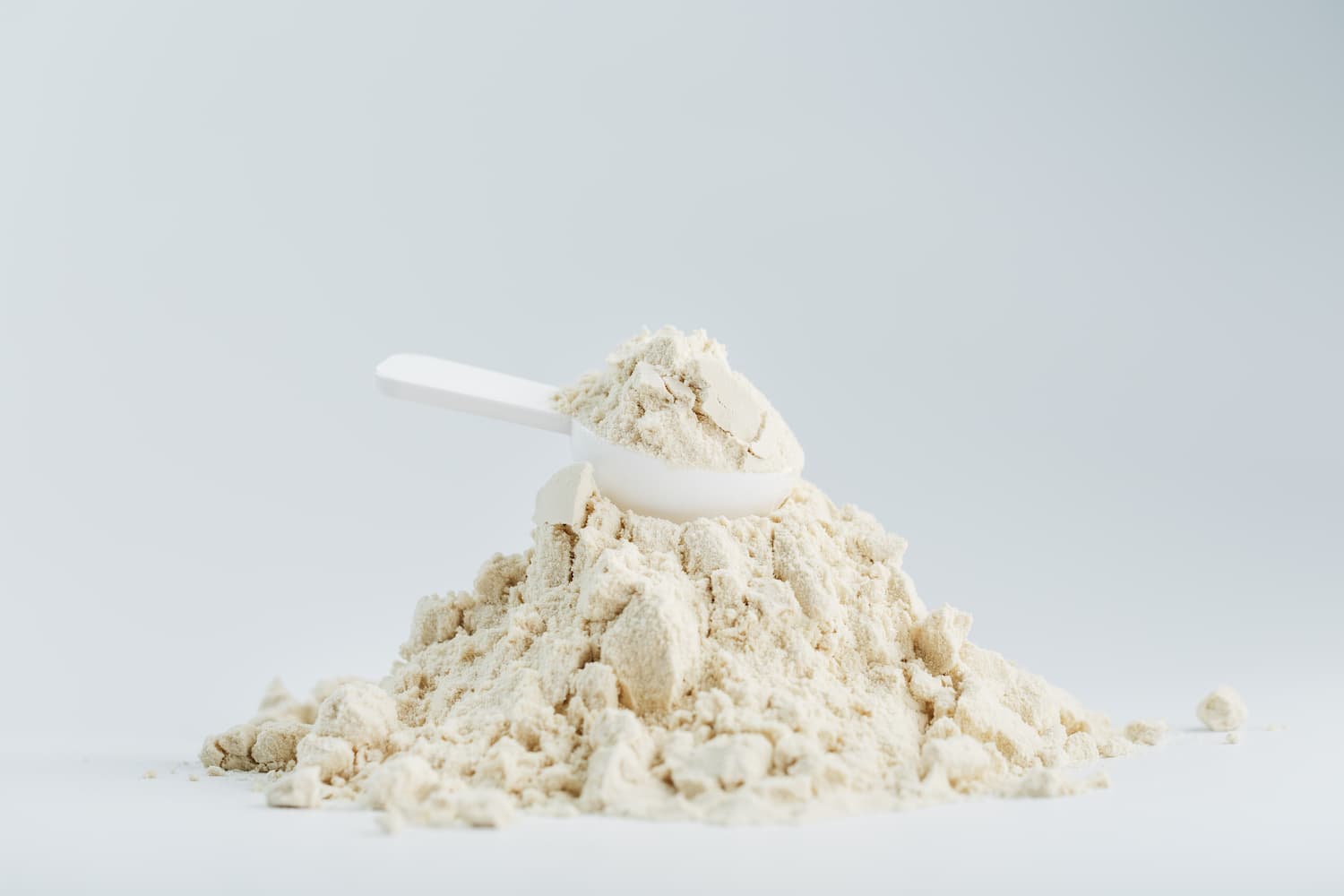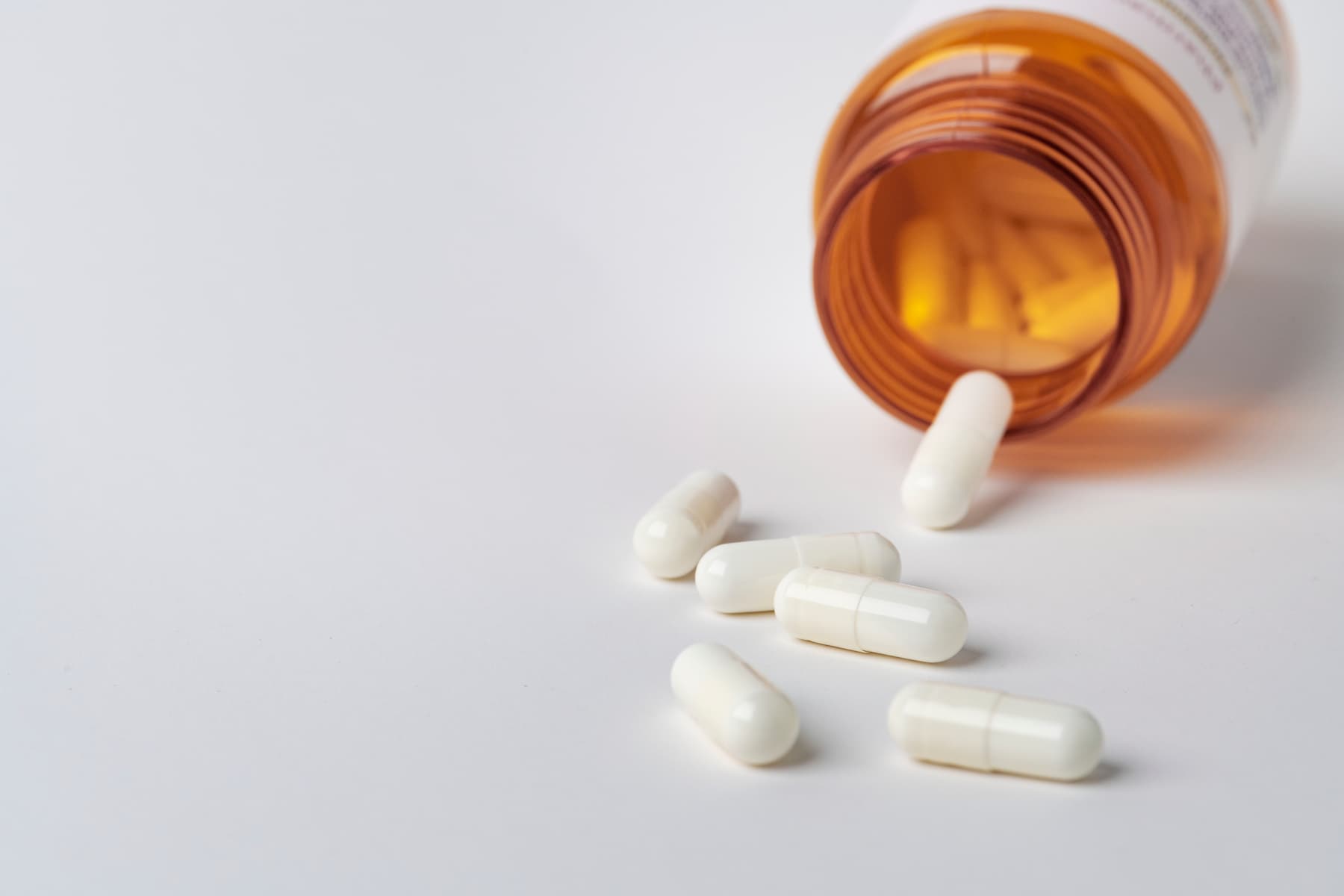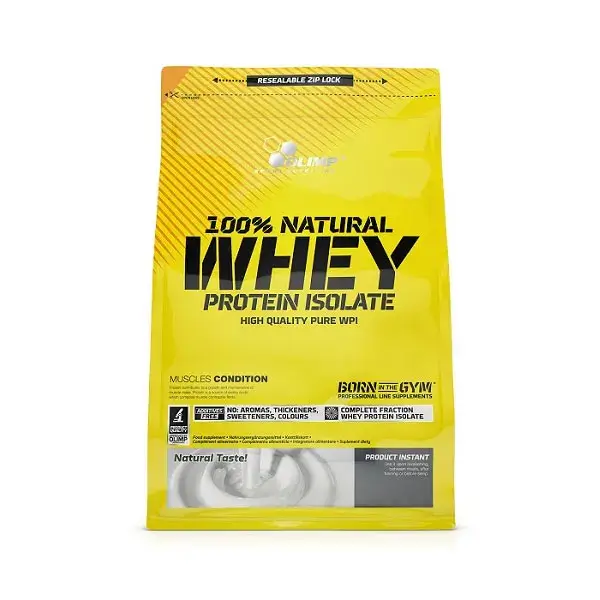How much protein a day to eat? Find out your requirements
Look after the protein in your diet whether you are on a weight gain, weight reduction or weight maintenance.


Learn more about our editorial process
.

Learn more about our editorial process
.

Learn more about our editorial process
.

Learn more about our editorial process
.
Why you can trust us
Articles on Natu.Care are written based on scientific research, data from government websites and other reliable sources. The texts are written in cooperation with doctors, nutritionists and other health and beauty experts. Articles are reviewed before publication and during significant updates.
.Learn more about our editorial process
.Information about advertisements
Content on Natu.Care may contain links to products from the sale of which we may receive a commission. When creating content, we adhere to high editorial standards and take care to be objective about the products discussed. The presence of affiliate links is not dictated by our partners, and we select the products we review ourselves completely independently.
.Learn more about our terms and Conditions
.Even if your goal is not 50 cm in the paw, you need to look after the protein in your diet. Talk of protein is dominated by muscle, but the body needs it not only there.
Statistics show that many Poles can't tell how much protein they should be eating per day and don't know how much they are actually getting. No more eating in the dark. Together with nutritionist Kuba Pągowski, we will help you count how much protein you need - taking into account your goal and health situation.
From this article you will learn:
.- How much protein per day you need to consume.
- How much protein to eat.
- How much protein to eat on a mass, but how much on a reduction. .
- How to calculate the protein requirements of your diet.
- How to calculate the protein requirements of your diet.
- How to spread your protein intake throughout the day.
- How to calculate your protein intake.
See also:
.- Whey protein concentrate (WPC) .
- Whey protein isolate (WPI) .
- Whey protein hydrolysate (WPH) .
- Protein-rich products .
- Protein nutrients .
- Plant protein
- Casein
Daily protein requirements
.The daily requirement for protein ranges from 1 g to 2.2 g per kg of body weight and is dependent on age, health, activity level and body composition goalsand.
Adequate dietary protein is important for the proper functioning of your body. Proteins are essential for many of the processes that occur in the body, such as the production of enzymes and hormones, tissue repair and regulation of metabolism .
By controlling the protein in your diet, you can also 'manipulate' the composition of your physique, i.e. build muscle mass or minimise its loss during reduction .
.How much protein do you need per day?
.In the table you will find information on how much protein per day you should eat depending on several factors. In some situations your protein requirement increases significantly and there is a reason for this. Find out how much you need.
|
Who? . |
How much protein per kg of body weight? | Who? |
| . |
Average adult of normal body weight | |
| . |
minimum 1 g . |
|
|
Adults with active lifestyles who participate in strength sports |
1.8-2.2 g |
|
|
Adults with active lifestyles involved in performance sports |
1.6-1.8 |
|
|
Girls and boys 10-18 years . |
ox. 1 g |
|
|
Pregnant women |
I trimester approx. 1.1 g, 2nd and 3rd trimester 1.2 g |
|
|
Breastfeeding women . |
1.4 g |
|
|
Persons over 65 years of age |
1.2 g, and in the case of malnutrition or chronic diseases 1.2-1.5 g . |
|
|
Person on a reduction diet (training or not training in any sports) | ||
| . |
1.8-2 g . |
The recommended minimum amount of protein for the average adult, or 1 g/kg body weight, is the portion a person needs to avoid deficiency. It does not specify the amount needed to improve body composition, that is, for example, to increase muscle relative to body fat.
The requirement of 1 g/kg body weight is therefore the absolute minimum. No one should go lower with their dietary supply of this macronutrient, especially seniors who are at risk of age-related muscle loss (sarcopenia), chronic disease or malnutritionand.
.How to calculate protein requirements
.The basic formula is:
.Your body weight x recommended amount of protein per kg body weight (see table)
.Examples:
- A woman with a body weight of 63 kg, training at the gym 2 x per week, who is starting to reduce and wants to lose weight healthily, should eat about 100 g of protein (63 × 1.6).
- A man weighing 86 kg, training at the gym 3 x per week, who wants to build muscle mass, should consume approximately 172 g of protein (86 × 2).
- A healthy senior woman weighing 50 kg, who walks daily, should eat approximately 60 g of protein (50 x 1.2).
And how much do you need? Take a calculator or count in your memory.
For freaks
Some people calculate protein requirements by taking into account the amount of body fat. However, this is an inaccurate calculation, as it is impossible to know exactly what percentage of body fat you have. Even a DEXA scan can be wrong by 5%and. Such calculations are often used by figure athletes.
How many grams of protein by weight?
.On weight it is recommended to consume between 1.8 and 2.2 g of protein per kg of body weight to ensure that the body has the right amount of protein needed for muscle building and regeneration.
When you strength train hard, micro-damage forms in your muscles. The body repairs the damaged fibres by fusing them together, which increases muscle mass and size - and proteins are like bricks in this process, building them up.
Protein is a key part of this process.
Because the body uses protein for many other tasks, it needs to have plenty of it available to take part in energy production, as well as leaving something for the muscles. Therefore, your need for mass increases.
More protein, more muscle
Broscience proclaims that the more protein you eat, the bigger muscles you will build. Unfortunately, the sources of this advice are anecdotes written on the door in the gym toilet. Science (real science) shows that consuming more protein than 2.2 g/kg has little benefitand. So kilocalories from protein are better spent on carbohydrates.
How many grams of protein on a reduction diet?
.During a reduction diet, an adequate amount of protein helps to preserve as much muscle mass as possible and can also have the effect of increasing satiety after a meal. It is therefore recommended to consume 1.8-2.4 g/kg body weight.
Some scientific studies suggest even higher intakes - up to 3.1 g/kg body weight for trained individuals. Work suggests that this amount helps athletes (mainly those competing in figure competitions) to retain more muscle mass during reductionand.
I tested on myself
.For the average person, protein amounts of >2.2 g/kg body weight may be too high. I remember when, on my reduction, I tested how I would feel on 2.5g, and a year later, on my next document I was consuming 2g. At 2.5 g/kg body weight I felt unpleasantly congested. And protein nutrients were overeating for a long time. On 2 g/kg body weight I felt better and managed to retain a great deal of muscle.
During a reduction you lose both body fat and muscle. By keeping an eye on the amount of protein in your diet, you can minimise the loss of valuable meat. However, tailor the amount to suit you and look at the total and components of your diet. It's not an art to get clogged up with a cottage cheese cube, only to be unable to look at it after a week (a colleague told me...).
Interesting findings
A meta-analysis of 10 scientific studies was published in 2023, which showed that very high-protein diets (>3.4 g protein/kg body weight) can lower testosterone. With high-protein diets (1.9-3.4 g protein/kg body weight), no such effects were observedand.
How much protein for vegans and vegetarians?
.Protein from plant foods is not as well absorbed as that of animal originand. In addition, most non-animal foods will not provide you with all the essential amino acids (EAA)and. Therefore, non-meat eaters should eat a variety of foods.
.Vegetarians have it somewhat easier, as they eat eggs or dairy products. Vegans, on the other hand, must take special care to ensure that their plate is a composition of different proteins. Protein requirements will be the same as for those on a diet without dietary restrictions.
Coke-vegetarian and coke omnivore need the same amount of protein, although the vegan friend needs to eat more carefully. I have noticed, however, that the further into the vege diet one gets, the better these people do in terms of composing and providing the necessary ingredients.
How much protein in pregnancy?
.Pregnancy increases the need for protein, as well as other important nutrients (e.g. DHA acid or vitamin D). A woman expecting a baby needs to eat for two (not for two) and provide herself with the right amount of protein, as it affects both the health of the mum and the development of the foetusand.
If you are pregnant, eat around 1.1-1.2g protein/kg body weight and ideally this should be protein from a variety of sources - animal but also plant-based. Protein supplements are not recommended during pregnancy - rely on a nutritious diet.
Dietary protein deficiency today mainly affects developing countries, where hunger and nutritional deficiencies are generally prevalent. However, this doesn't mean you don't need to be vigilant during pregnancy - against the odds, it's worth monitoring the amount of protein-rich foods in your diet.
ALLDEYNN WHEYROSE
Product description
Protein supplement containing whey protein concentrate (WPC) with added digestive enzymesós. It digests well, is an easy and quick way to provide protein and can be consumed by people with lactose intolerance. It will work well not only as a stand-alone drinkóy but also as a tasty addition to shakesóy, dessertsóy, oatmeal or omeletóy.
WHEYROSE contains five digestive enzymes that help break down macromolecules into smaller components, so that the ingredients from food and the nutrient are absorbed even better. This minimises or even eliminates digestive discomfort. Such an addition is rare in protein supplements.
.Pros and cons
Protein supplement containing whey protein concentrate (WPC) with added digestive enzymesós. It digests well, is an easy and quick way to provide protein and can be consumed by people with lactose intolerance. It will work well not only as a stand-alone drinkóy but also as a tasty addition to shakesóy, dessertsóy, oatmeal or omeletóy.
WHEYROSE contains five digestive enzymes that help break down macromolecules into smaller components, so that the ingredients from food and the nutrient are absorbed even better. This minimises or even eliminates digestive discomfort. Such an addition is rare in protein supplements.
.Additional information
Protein supplement containing whey protein concentrate (WPC) with added digestive enzymesós. It digests well, is an easy and quick way to provide protein and can be consumed by people with lactose intolerance. It will work well not only as a stand-alone drinkóy but also as a tasty addition to shakesóy, dessertsóy, oatmeal or omeletóy.
WHEYROSE contains five digestive enzymes that help break down macromolecules into smaller components, so that the ingredients from food and the nutrient are absorbed even better. This minimises or even eliminates digestive discomfort. Such an addition is rare in protein supplements.
.User review
Protein supplement containing whey protein concentrate (WPC) with added digestive enzymesós. It digests well, is an easy and quick way to provide protein and can be consumed by people with lactose intolerance. It will work well not only as a stand-alone drinkóy but also as a tasty addition to shakesóy, dessertsóy, oatmeal or omeletóy.
WHEYROSE contains five digestive enzymes that help break down macromolecules into smaller components, so that the ingredients from food and the nutrient are absorbed even better. This minimises or even eliminates digestive discomfort. Such an addition is rare in protein supplements.
.ALLDEYNN VEGEROSE
Product description
A protein supplement made from five plant proteins enriched with acacia fibre, flaxseed, MCT oil and the probiotic-prebiotic complex LactoWise®. It is a synbiotic thatós stimulates the developmentóy and growth of beneficial bacteria in the gastrointestinal tract and shows a beneficial effect on the condition of the digestive system.
Pros and cons
A protein supplement made from five plant proteins enriched with acacia fibre, flaxseed, MCT oil and the probiotic-prebiotic complex LactoWise®. It is a synbiotic thatós stimulates the developmentóy and growth of beneficial bacteria in the gastrointestinal tract and shows a beneficial effect on the condition of the digestive system.
Additional information
A protein supplement made from five plant proteins enriched with acacia fibre, flaxseed, MCT oil and the probiotic-prebiotic complex LactoWise®. It is a synbiotic thatós stimulates the developmentóy and growth of beneficial bacteria in the gastrointestinal tract and shows a beneficial effect on the condition of the digestive system.
Expert opinion
A protein supplement made from five plant proteins enriched with acacia fibre, flaxseed, MCT oil and the probiotic-prebiotic complex LactoWise®. It is a synbiotic thatós stimulates the developmentóy and growth of beneficial bacteria in the gastrointestinal tract and shows a beneficial effect on the condition of the digestive system.
ALLDEYNN VEGEROSE
Product description
A protein supplement made from five plant proteins enriched with acacia fibre, flaxseed, MCT oil and the probiotic-prebiotic complex LactoWise®. It is a synbiotic thatós stimulates the developmentóy and growth of beneficial bacteria in the gastrointestinal tract and shows a beneficial effect on the condition of the digestive system.
Pros and cons
A protein supplement made from five plant proteins enriched with acacia fibre, flaxseed, MCT oil and the probiotic-prebiotic complex LactoWise®. It is a synbiotic thatós stimulates the developmentóy and growth of beneficial bacteria in the gastrointestinal tract and shows a beneficial effect on the condition of the digestive system.
Additional information
A protein supplement made from five plant proteins enriched with acacia fibre, flaxseed, MCT oil and the probiotic-prebiotic complex LactoWise®. It is a synbiotic thatós stimulates the developmentóy and growth of beneficial bacteria in the gastrointestinal tract and shows a beneficial effect on the condition of the digestive system.
Expert opinion
A protein supplement made from five plant proteins enriched with acacia fibre, flaxseed, MCT oil and the probiotic-prebiotic complex LactoWise®. It is a synbiotic thatós stimulates the developmentóy and growth of beneficial bacteria in the gastrointestinal tract and shows a beneficial effect on the condition of the digestive system.
How to break down protein into meals?
.Optimally, it is advisable to spread your protein supply over 3-4 meals, and there should be 0.4-0.55 g/kg body weight in each. This will ensure that each of your meals is nutritious and promotes muscle protein synthesis. This is typically 20-40g of protein per meal.
Examples:
- A woman aged 65 years and weighing 60 kg consumes 72 g of protein per day. She eats 4 meals a day and tries to make sure there is about 20 g of protein in each.
- Woman aged 65 and weighing 60 kg.
- A woman aged 35 years and weighing 60 kg who trains at the gym eats 120 g of protein per day. She eats five meals - in four main meals she eats 20-30 g of protein, and in one she puts on a carbohydrate snack.
- A 40 year old man weighing 95kg, strength training and occasional boxing eats 190 protein a day. He eats 3 main meals and 2 snacks, aiming for around 40g of protein per meal.
If you have the option, it would be an added benefit to your body to spread protein over 3-4 meals, however, a 24-hour supply will still be most important..
 .
.
Kuba Pągowski clinical dietitian
Don't let yourself go crazy
.As you can see, it all depends on your lifestyle, health and expectations. We're human - I don't always get the ideal macro distribution throughout the day either, and for that reason I don't cut into a cottage cheese cube or salad of chicken thighs, wings and breasts before bed.
How to beat protein
.Some people find it difficult to eat enough protein. Sometimes the reason is a very high requirement (a friend of mine really suffered when he had to eat 200g) or an aversion to certain protein-rich foods (e.g. vegans). And sometimes, just like that - protein doesn't come in.
What to do then?
.- .
- Check that you are not overdoing it with protein. I know there is a protein craze at the moment, but you only need as little as 1.8g/kg of body weight for effective muscle building - not necessarily 2.5g/kg.
- Get to know all the products rich in protein and add them to your menu. You're sure to find something for you, even on a meat-free diet. .
- Consider a protein supplement. The choice is huge - from whey protein to plant-based. And there are dozens of flavours. .
- Incorporate protein nutrition into your meals - oatmeal, omelettes or desserts. .
If vegan nutrients don't taste good to you - you can bet on vegan mixes. They often have a better aminogram and taste..
 .
.
Kuba Pągowski clinical dietitian
Feedback articles:
.- Protein-rich foods .
- Whey protein concentrate (WPC) .
- Whey protein isolate (WPI) .
- Whey protein hydrolysate (WPH) .
- Protein nutrient
- Plant protein .
Protein under supervision
Do you know how much protein you're eating per day? If not, try counting the macronutrients in your diet for a few days. You can use kilocalorie counting apps such as Fitatu, MyFitnessPal or FatSecret to do this. When I have my mentees do this - they are surprised because they thought they were eating more.
Protein bioavailability in meals
.Till now there is a circulating misconception that the body will not assimilate more than 30g of protein at once. Really - some people claim that you will eat 40g and that 10g will go to waste. It will go English out of the body, convinced of its uselessness.
This statement may have been derived from a 1950s study in which increased urinary nitrogen loss was observed with higher protein intakeand. This was thought to mean that extra protein was being 'wasted'. Fortunately, this is not true.
In practice, muscle protein synthesis (MPS) reaches its maximum level when you provide yourself with approximately 20-30 grams of protein per serving, and larger amounts will simply be used by the body for many other processes, such as energy or hormone productionand.
.MPS is crucial for building, repairing and maintaining muscle mass. When muscle protein synthesis exceeds protein breakdown (i.e. catabolism), muscles grow..
 .
.
Kuba Pągowski clinical dietitian
Think about it - restricting protein uptake makes no evolutionary sense. Your body is more than happy to use protein to... simply function properly. Excess protein can also be converted to urea and removed from the body.
100g of protein at once? Please
A study from late 2023 found that ingesting 100 g of protein (20% whey protein and 80% casein) stimulated MPS for more than 12 hours after a whole-body workoutand.
Role of protein in the body
.Proteins affect many processes in your bodyand:
.- .
- promote tissue growth and repair, .
- participate in the production of hormones and enzymes, .
- strengthen the immune system, .
- are a source of energy,
- are a source of energy.
- regulate metabolic processes (e.g. digestion), .
- transport components in the body (e.g. oxygen to cells), .
You are one big protein
.The amount of protein in the body of the average adult is about 9-11 kg, and about 300 g is exchanged per dayand.
See also:
.- Omega-3 in the diet of athletes .
- Protein nutrition
- Collagen for athletes
- Creatine
- Arginine
- Citrulline
- Caffeine
- Cordyceps
- Maca
- Glutamine
Summary
.- Daily protein requirements range from 1 to 2.2 g/kg body weight and depend on health, physical activity and body composition goals. .
- A protein requirement of 1 g/kg body weight is the absolute minimum and no one should consume less. .
- Higher protein requirements apply to pregnant and breastfeeding women, people building muscle mass or reducing body fat, and seniors. .
- Optimally, it is advisable to spread protein over 3-4 meals, i.e. ensure that there is 20-40 g of protein in each meal (depending on your requirements). .
- Any amount of protein will assimilate in the body and be used by the body, and the information about a maximum of 30 g is a myth. .
FAQ
.What is the daily requirement for protein?
.The daily requirement for protein is between 1 and 2.2 g per kg of body weight. Protein intake depends on several factors such as age, health status, physical activity level or body composition goals.
How many times a day to eat protein?
.An optimal way to provide yourself with protein is to spread your daily requirement over 3-4 portions. It is a good idea to have 0.4-0.55 g/kg of total body weight, or about 20-40 g of protein, in each meal.
.This distribution is beneficial for muscle protein synthesis, the mechanism responsible for the growth, repair and regeneration of muscle tissue after training or injury.
How much protein for muscle building?
.For muscle building, it is recommended to consume between 1.8 and 2.2 g of protein per kg of body weight. It is best to spread the daily protein supply over 3-4 meals and ensure that there is a minimum of 20 grams protein in each.
How much weight can you gain by taking protein?
.From protein you can gain weight just like from the other macronutrients - fats and carbohydrates. You get fat from an excess of kilocalories in your diet. So if you regularly exceed your daily calorie requirements, you are getting fat. The excess energy can come from protein and you can then gain 5, 10 or even 20 kilos.
Will 50g of protein in a meal be assimilated?
.Yes, 50 g of protein from a meal will be assimilated in the body. From a nutritional point of view, assimilation is the passage of nutrients from the gut to the systemic circulation. Based on this definition, the amount protein that can be assimilated is unlimited. Your body will use every bit of protein for many processes in the body - nothing goes to waste.
How much to take in protein after a workout?
.After training, make sure you eat a meal containing 0.4-0.55g of protein per kg of your body weight (i.e. around 20-40g). Remember that it is the total supply of protein throughout the day that counts.
How many percentages of protein, fat and carbohydrate per day?
.The percentage distribution of macronutrients in the diet should be:
.- protein - 1.8-2.4 g/kg body weight, .
- fat - 0.8-1.2 g/kg body weight, .
- carbohydrates - remaining amount. .
For example, an 85 kg footballer with a daily requirement of 4000 kcal should eat 153 g protein, 85 g fats and 655 g carbohydrates.
Resources
.Duda, K., Majerczak, J., Nieckarz, Z., Heymsfield, S. B., & Zoladz, J. A. (2019). Chapter 1-Human Body Composition and Muscle Mass. In J. A. Zoladz (Ed.), Muscle and Exercise Physiology (pp. 3-26). Academic Press. https://doi.org/10.1016/B978-0-12-814593-7.00001-3
Lactation, I. of M. (US) C. on N. S. D. P. and. (1990). Protein and Amino Acids. In Nutrition During Pregnancy: Part I Weight Gain: Part II Nutrient Supplements. National Academies Press (US). https://www.ncbi.nlm.nih.gov/books/NBK235221/
Linschooten, J. O., Verwijs, M. H., Beelen, J., de van der Schueren, M. A. E., & Roodenburg, A. J. C. (2021). Low awareness of community-dwelling older adults on the importance of dietary protein: New insights from four qualitative studies. Journal of Nutritional Science, 10, e102. https://doi.org/10.1017/jns.2021.92
Liyanapathirana, N. N., Grech, A., Li, M., Malik, A., Lenzen, M., & Raubenheimer, D. (2022). Nutrient-sensitive approach for sustainability assessment of different dietary patterns in Australia. The American Journal of Clinical Nutrition, 115(4), 1048-1058. https://doi.org/10.1093/ajcn/nqab429
Moon, J., & Koh, G. (2020). Clinical Evidence and Mechanisms of High-Protein Diet-Induced Weight Loss. Journal of Obesity & Metabolic Syndrome, 29(3), 166-173. https://doi.org/10.7570/jomes20028
Trommelen, J., van Lieshout, G. A. A., Nyakayiru, J., Holwerda, A. M., Smeets, J. S. J., Hendriks, F. K., van Kranenburg, J. M. X., Zorenc, A. H., Senden, J. M., Goessens, J. P. B., Gijsen, A. P., & van Loon, L. J. C. (2023). The anabolic response to protein ingestion during recovery from exercise has no upper limit in magnitude and duration in vivo in humans. Cell Reports. Medicine, 4(12), 101324. https://doi.org/10.1016/j.xcrm.2023.101324
Visser, M., Hung, Y., & Verbeke, W. (2021). Protein Knowledge of Older Adults and Identification of Subgroups with Poor Knowledge. Nutrients, 13(3), Article 3. https://doi.org/10.3390/nu13031006
Whittaker, J. (2023). High-protein diets and testosterone. Nutrition and Health, 29(2), 185-191. https://doi.org/10.1177/02601060221132922
Editorials
Meet the team



Vegan protein supplements add protein to the diets of athletes and non-athletes alike.

Methionine is a little-known amino acid that is responsible for many functions in the body.

Cysteine is one of the amino acids responsible for the production of collagen.



